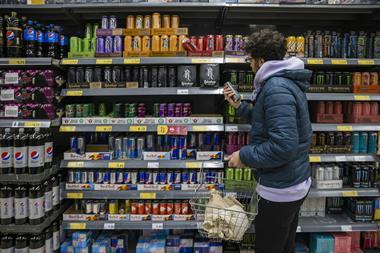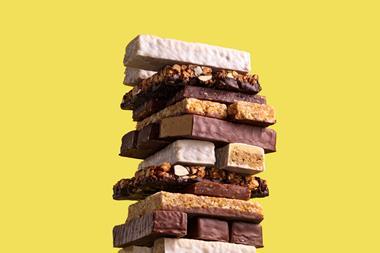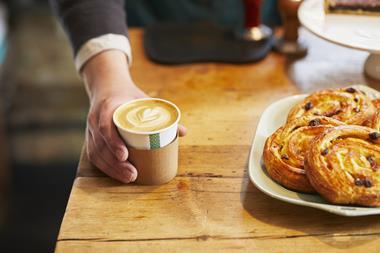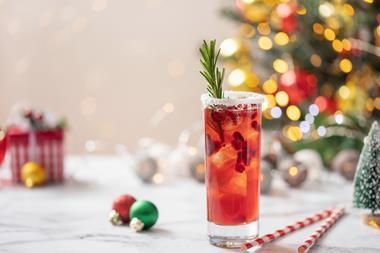Although we are still a nation of tea drinkers, it does appear that some tea fans are defecting to coffee.
The volume of tea bought last year dropped by 1.4% in the year to June 13, 2010, according to Kantar Worldpanel, whereas volume sales of both instant and roast and ground coffee both went up by 3.5% and 5.4% respectively.
In fact, roast and ground coffee was the real star of the hot beverages market last year, and the increasing popularity of these products gave this category a 15.9% increase in value to £175.6m.
This pattern has also been observed in the Budgens store in Stoneleigh Broadway, as Dee Dee explains: “We have noticed a shift in sales from coffee granules to filter coffee. Where Nescafé and Kenco granules continue to dominate the top-sellers’ spots, our newer lines also show a steady upward pattern, especially Lyons ready-to-use filter coffee bags, which sell for £2.47 for 18; Rombouts filter coffee (£3.05 for 10); and Dolce Gusto (£3.68 for 16 capsules). These now make up almost 30% of our coffee sales, with the typical customer being students and young office workers.”
Coffee to go
It’s not only packaged hot beverages that convenience retailers can cash in on they also have the option of offering coffee and tea to go, to appeal to consumers who are on the move. Paul Chadderton, managing director of Tchibo Coffee International, says this is still a profitable area in the convenience sector, despite the tough economic climate. “We are certainly seeing an increase in the number of people drinking coffee on the go,” he explains. “Perhaps it is indicative of the busy lives we lead, but there is a trend towards consumers purchasing hot drinks while out and about, and they are opting for premium international brands that offer a quality experience, such as Tchibo.” In the past year, the company has launched premium Sir Henry teas and infusions for the foodservice sector, its Coffee Pod housing unit and has introduced Paybyday, a concept which, says Chadderton, is designed to help convenience retailers maximise profits from the speciality coffee-to-go sector. “No one else is offering customers the opportunity to calculate and realise daily profits in this way,” he says. “We are providing retailers with an attractive method of owning our Coffee Pod, which is powered by our most popular bean-to-cup technology. A small daily charge and minimal footprint can generate profits of £14,000 a year,” he explains.
The rise in coffee chains, which are now dotted all over the UK, has been instrumental in educating consumers about the styles and flavours of coffee. And, of course, these outlets often attract young professionals who are short of time and looking for a coffee to grab on-the-go.
Consequently, coffee is now the drink of choice for much younger consumers than before, and these fans often want to replicate their favourite styles at home.
Because of this, ground coffee is now perceived as an affordable luxury, according to producer Bettys and Taylors of Harrogate.
The company says that two of its best-selling filter and cafetière coffees are Taylors of Harrogate Lazy Sunday and Rich Italian. Sales for the former have grown 32% each year, while sales for Rich Italian are up by 53%, according to Taylors roast and ground manager Kevin Sinfield. In addition, the brand’s Decaffé option has also grown by 33%.
A move towards luxury variants has also helped grow sales of instant coffee, which remains by far the biggest coffee category.
Steve Mounty, director of convenience and distributive at Kraft Foods UK, confirms that sales of instant coffee have been driven by a growing interest in premium and super-premium brands.
“Convenience retailers should align themselves with the changing shape of the coffee market, taking advantage of the growing sectors and stocking leading brands that deliver on quality and taste,” he says.
To help convenience retailers get the most out of premium coffee sales at the end of 2010, Kraft Foods presented its customers with pricemarked packs on its 100g Kenco freeze-dried range. Kenco Rich and Smooth were available in limited-edition £2 pricemarked 100g jars, compared with the usual rrp of £2.89.
Producers continued to invest in brand activity last year to ensure the category maintained its popularity. A new campaign for Nescafé Gold Blend hit TV screens in May 2010 (and aired again in September), bringing back the iconic Gold Blend couple.
“The Nescafé Gold Blend couple is one of the most successful advertising campaigns of all time, and we had an important legacy to build on,” says Nestlé UK trade communications manager Graham Walker. “We’re confident the new advert has achieved just that.”
The company has also been making efforts to appeal to emerging new and younger drinkers, as well as re-engaging existing drinkers.
The launch of its Nescafé Original 3in1, a combination of coffee, sugar and whitener, in September was designed to tap in to the increasing demand for convenience products. And Walker says it will also help to draw in younger coffee drinkers. “Convenience continues to dominate the hot beverage category, but nowhere is this more prominent than when targeting consumers under 25,” he says.
Read more
Cash in: Horlicks and hot chocolate
Cash in: Ones to watch
Cash in: Tea
Cash in: Hot beverages






























No comments yet